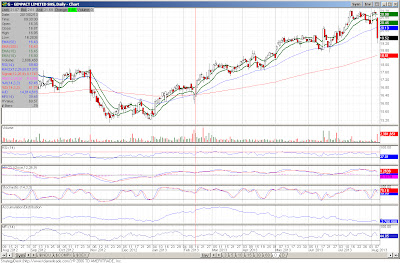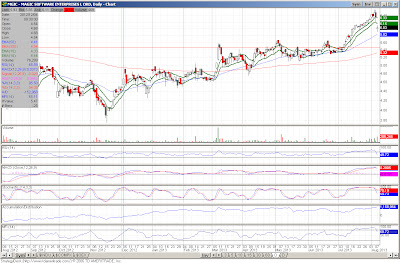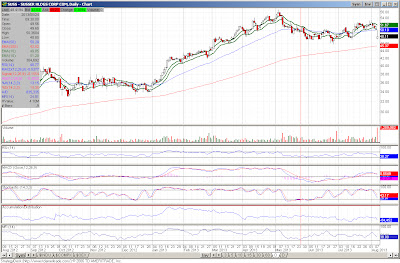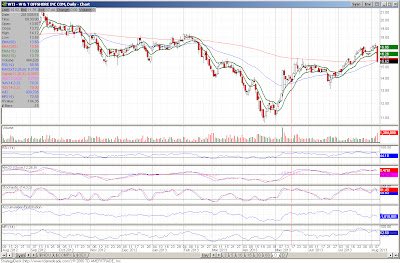This article was originally posted at the
Economics Policy Journal. I don't mean to attack Blodget in any way, but the article is great read in that it highlights why understanding economics is important.
Business Insider's Henry Blodget is at it again. He is out with an
article that shows he really has no clue as to how the economy works. It starts with the headline to the article,
Sorry, It's Not A 'Law Of Capitalism' That You Pay Your Employees As Little As Possible.
What exactly does he mean by this?Anyone with a basic economics 101
understanding should get that supply and demand determines wages. Any
businessman can pay employees more than the going wage, if he so
chooses, but that is simply a gift. Blodget's headline should really
read,
It's Not a 'Law of Capitalism' that Employers Can't Give Out Gifts to Their Employees.
And this is true. Employers can give above market wages, but why?
If it is about gift giving, why shouldn't employees work below the
market wage, as a gift to employers? It's really wacky thinking to start
advocating non-market wages in any direction. Exchanges are done,
including work/wage exchanges, when two parties are willing to make the
exchange. Adding gift giving is simply bizarre.
Blodget then throws this doozie into his column:
If average Americans don't get paid living wages, they can't spend much
money buying products and services. And when average Americans can't buy
products and services, the companies that sell products and services to
average Americans can't grow. So the profit obsession of America's big
companies is, ironically, hurting their ability to accelerate revenue
growth.
I have
discussed this bizarre notion of the "living wage" before.
What does Blodget think, that those not earning what Blodget deems a
living wage, are dead, don't eat, don't have a place to sleep, don't
have cell phones? The use of the term "living wage" is a con that
distorts reality.
As for the nonsense that when "average Americans can't buy products and
services, the companies that sell products and services to average
Americans can't grow," Blodget shows that he simply doesn't believe in
supply and demand. There can be know general glut of goods, prices would
simply fall so that markets clear. It's Say's Law.
Murray Rothbard
explained
what the Blodget's of the world are up to in their concern about
overproduction. Their usual solution to so-called overproduction is
government spending rather than Blodget's call for businesses to overpay
their workers, but the logic in understanding the fallacy is the same:
Essentially Say's law is a stern and proper response to the various
economic ignoramuses as well as self-seekers who, in every economic
recession or crisis, begin to complain loudly about the terrible problem
of general "overproduction" or, in the common language of Say's day, a
"general glut" of goods on the market. "Overproduction" means production
in excess of consumption: that is, production is too great in general
compared to consumption, and hence products cannot be sold in the
market. If production is too large in relation to consumption, then
obviously this is a problem of what is now called "market failure," a
failure which must be compensated by the intervention of
government.[...]
Say understandably reacted in horror to this analysis and to the
prescription. In the first place, he pointed out, the wants of man are
unlimited, and will continue to be until we achieve genuine general
superabundance — a world marked by the prices of all goods and services
falling to zero. But at that point there would be no problem of finding
consumer demand, or, indeed, any economic problem at all. There would be
no need to produce, to work, or to worry about accumulating capital,
and we would all be in the Garden of Eden.[..]
Since, apart from the Garden of Eden, production always falls short of
man's wants, this means that there is no need to worry about any lack of
consumption. The problem that limits wealth and living standards is a
deficiency of production. On the market, Say points out, producers
exchange their products for money and they use the money to buy the
products of others. That is the essence of the exchange, or market,
economy. Therefore the supply of one good constitutes, at bottom, the
demand for other goods. Consumption demand is simply the embodiment of
the supply of other products, whose owners are seeking to purchase the
products in question. Far better to have demand emerging from the supply
of other products, as on the free market, than for the government to
stimulate consumer demand without any corresponding production.
For the government to stimulate consumption by itself "is no benefit to
commerce; for the difficulty lies in supplying the means, not in
stimulating the desire for consumption; and we have seen that production
alone, furnishes the mean[...]
Those who complain about overproduction or underconsumption rarely talk
in terms of price, yet these concepts are virtually meaningless if the
price system is not always held in mind. The question should always be:
production or sales at what price! Demand or consumption at what price!
There is never any genuine unsold surplus, or "glut," whether specific
or general over the whole economy, if prices are free to fall to clear
the market and eliminate the surplus.
Bottom line: Blodget really doesn't understand how a free market economy
works. This leads him to become some kind of bizarre advocate of
non-market wages. He, in other words, is a socialist thinker, who has a
nutty view that wages should be determined with the "good of the
society" in mind rather than by markets. Damn, Hayek's view of prices as
signals, Blodget has better prices in his own mind!
Blodget continues:
Obviously, the folks who own and run America's big corporations want to
do as well as they can for themselves. But the key point is this:
It is not a law that they pay their employees as little as possible.
It is a choice.
It is a choice made by senior managers and owners who want to keep the
highest possible percentage of a company's wealth for themselves.
It is, in other words, a selfish choice.
Ah yes, the problem of selfishness. I'll let Ludwig von Mises and Adam Smith slap this one down. In
Socialism, Mises wrote:
That everyone lives and wishes to live primarily for himself does not
disturb social life but promotes it, for the higher fulfillment of
individual's life is possible only in and through society
Smith wrote:
It is not from the benevolence of the butcher, the brewer, or the baker,
that we expect our dinner, but from their regard to their own interest.
We address ourselves, not to their humanity but to their self-love, and
never talk to them of our necessities but of their advantages.
---
The natural effort of every individual to better his own condition...is
so powerful, that it is alone, and without any assistance, not only
capable of carrying on the society to wealth and prosperity, but of
surmounting a hundred impertinent obstructions with which the folly of
human laws too often encumbers its operations.
---
Every individual... neither intends to promote the public interest, nor
knows how much he is promoting it... he intends only his own security;
and by directing that industry in such a manner as its produce may be of
the greatest value, he intends only his own gain, and he is in this, as
in many other cases, led by an invisible hand to promote an end which
was no part of his intention.
Does Blodget really want to see a world that doesn't run on selfishness,
where willy nilly people just pass things out to others? That market
prices should be tossed aside? Hey Henry, let's get started on this,
send me a check any time.
You got Bezos millions, I didn't.
For Blodget to make the proposals he does, he can't possibly understand
basic economics. He is thinking like a socialist. I will quote Blodget
himself as to the overall problems with his thinking:
These days, if you suggest that great companies should serve several
constituencies (customers, employees, and shareholders) and that
American companies should share more of their wealth with the people of [sic]
generate it (employees), you get called a "socialist." You get called a
"liberal." You get told that you "don't understand economics." You get
accused of promoting "wealth confiscation." You get told that, in
America, people get paid exactly what they deserve to get paid: Anyone
who wants to get paid more should go out and "start their own company"
or "demand a raise" or "get a better job."
In other words, you get told that anyone who suggests that great
companies should share the value they create with all three
constituencies instead of just lining the pockets of shareholders is an
idiot.
Well said, Henry.


































